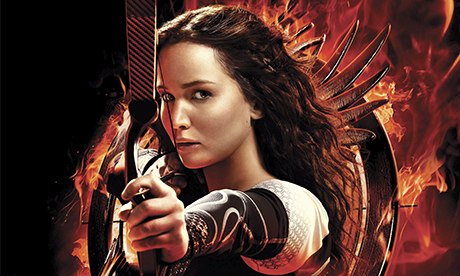
If you've skimmed the e-ink pages of a Kindle, you've probably come across a handful of passages underlined with a slight squiggle, akin to Microsoft Word's spellcheck. Kindle has for the past few years given users the opportunity to see "popular highlights": the passages in their ebooks that readers most often highlight or annotate.
The books most highlighted are often the most read – Suzanne Collins's Hunger Games trilogy dominates the Amazon ranking of highlights. Eight of the 10 most highlighted passages on Kindles are from The Hunger Games or its sequels; the other two are from Pride and Prejudice. It's interesting to note what people highlight, though. Not the smutty scenes at which a more lascivious reader might surreptitiously bend over a page corner. The highlights reveal that most readers of ebooks are unabashedly sentimental.
Passages with kernels of wisdom are also hot: 5,291 readers found the lines "I have no data yet. It is a capital mistake to theorise before one has data. Insensibly one begins to twist facts to suit theories, instead of theories to suit facts", in The Adventures of Sherlock Holmes, worthy of rememberance in our era of instant comment and social media. A line in Danny Dorling's So You Think You Know About Britain? – "There are more nurses from Malawi working in Manchester alone than there are nurses in all of Malawi" – is typical of the kind of quote highlighted in non-fiction: an easily memorable soundbite upending some widely held assumption.
The classics are understandably heavily highlighted, because they're heavily read. A passage in Moby Dick – "Heaven have mercy on us all – Presbyterians and Pagans alike – for we are all somehow dreadfully cracked about the head, and sadly need mending" – has been highlighted by 598 readers, who may or may not also be cracked about the head. Anna Karenina is heavily annotated far beyond the obvious "Happy families are all alike; every unhappy family is unhappy in its own way", although that has attracted the eye of 4,086 readers.
The appeal of the shared notes and highlights stems from what's enjoyable about physical books: picking up a secondhand book or finding a novel in a library, flicking through and finding evidence of who has read it before you. Notes in the margins, underlined passages: an affirmation from a previous reader that certain lines are particularly profound can add an extra edge to your journey through the pages. Or if you're a particularly lazy student, knowing which passages have caught previous readers' eyes is a boon. Conversely, readers of The Marriage Plot may find my first ever public note, "I HATE JEFFREY EUGENIDES", less than helpful.
As an act of intellectual voyeurism, this is all good fun. But it also feeds into a greater appreciation of novels: the high volume of highlighting in teenage fiction is symptomatic of a need to connect. Alarmists who claim that the young don't read nowadays may be amazed at the evidence in Kindle's highlights chart of how teenagers linger over fiction. And it's also social: people can see anything you highlight, so picking out passages is an expression of your better self. It's a mindful way of reading, but also quite public. When highlighting or annotating any part of an ebook, the eyes of dozens of other future readers are peering over your shoulder.
The five most highlighted passages
1. Because sometimes things happen to people and they're not equipped to deal with them.
Catching Fire by Suzanne Collins, highlighted by 17,784 Kindle users
2. It is a truth universally acknowledged, that a single man in possession of a good fortune must be in want of a wife.
Pride and Prejudice by Jane Austen, highlighted by 9,260 Kindle users
3. The rules of the Hunger Games are simple. In punishment for the uprising, each of the twelve districts must provide one girl and one boy, called tributes, to participate. The twenty-four tributes will be imprisoned in a vast outdoor arena that could hold anything from a burning desert to a frozen wasteland. Over a period of several weeks, the competitors must fight to the death. The last tribute standing wins.
The Hunger Games by Suzanne Collins, highlighted by 9,031 Kindle users
4. It takes ten times as long to put yourself back together as it does to fall apart.
Mockingjay by Suzanne Collins, highlighted by 8,833 Kindle users
5. "I just want to spend every possible minute of the rest of my life with you," Peeta replies.
Catching Fire by Suzanne Collins, highlighted by 8,500 Kindle users

